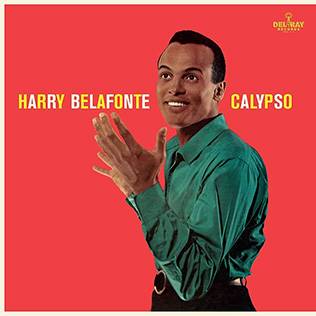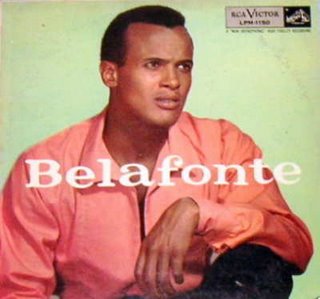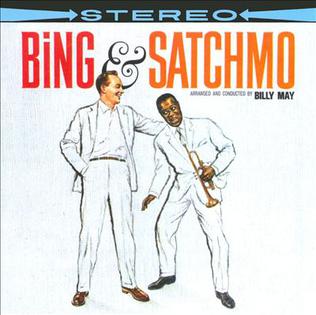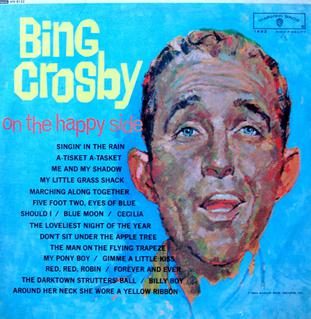"Moments to Remember" is a 1955 popular song about nostalgia recorded by Canadian quartet The Four Lads. The song was originally written by Robert Allen and Al Stillman for Perry Como but was turned down by Como's management.
"Lullaby of Broadway" is a popular song with music written by Harry Warren and lyrics by Al Dubin, published in 1935. The lyrics salute the nightlife of Broadway and its denizens, who "don't sleep tight until the dawn."

"White Christmas" is a song reminiscing about an old-fashioned Christmas setting. Written by Irving Berlin for the 1942 musical film Holiday Inn, the song won the Academy Award for Best Original Song at the 15th Academy Awards. Originally sung by Bing Crosby, it topped the Billboard chart for 11 weeks and returned to the number one position again in December 1943 and 1944. His version would return to the top 40 a dozen times in subsequent years.
"Ac-Cent-Tchu-Ate the Positive" is a popular song which was published in 1944. The music was written by Harold Arlen and the lyrics by Johnny Mercer. The song was nominated for the Academy Award for Best Original Song at the 18th Academy Awards in 1945 after being used in the film Here Come the Waves.

Calypso is the third studio album by recording artist Harry Belafonte, released by RCA Victor (LPM-1248) in 1956. The album became his second consecutive number-one album on the Billboard Top Pop Albums chart, where it peaked for 31 weeks. Calypso was the first Long Play record album to sell over one million copies.

Norman Luboff was an American music arranger, music publisher, and choir director.

I'll See You in My Dreams was a 10" LP album issued by Columbia Records as catalog # CL-6198 on December 14, 1951, featuring Doris Day and Paul Weston's orchestra, containing songs from the soundtrack of the movie of the same name. The album peaked at number 1 on the Billboard Best Selling Pop Albums chart in March 1952.

Le Bing is a 1953 album by Bing Crosby. It was Crosby's first studio album and was released by his longtime label, Decca Records. Le Bing is a concept album where all the songs are sung in French.

Songs I Wish I Had Sung the First Time Around was Bing Crosby's fourth album for Decca and his fifth LP, recorded and originally released in 1956 on vinyl as Decca DL 8352.

Merry Christmas is a Christmas-themed compilation album by Bing Crosby that was released in 1945 on Decca Records. It has remained in print through the vinyl, CD, and downloadable file eras, currently as the disc and digital album White Christmas on MCA Records, a part of the Universal Music Group, and currently on vinyl as Merry Christmas on Geffen Records. It includes Crosby's signature song "White Christmas", the best-selling single of all time with estimated sales of over 50 million copies worldwide. The album was certified 4× Platinum by RIAA for selling over 4 million copies in United States. The original 1945 release and subsequent re-releases and re-packages spent a total of 39 weeks at no. 1 on the Billboard pop albums chart.
The following is a discography of singles and albums recorded by American singer Frankie Laine.

Belafonte is the second studio album by American recording artist Harry Belafonte, released by RCA Victor in late 1955. The album was the first number one on the Billboard Top Pop Albums chart, topping the chart for six weeks before being knocked out of the top spot by Elvis Presley's self-titled debut album, also issued by RCA Victor.

Bing & Satchmo is a 1960 studio album by Bing Crosby and Louis Armstrong that was arranged and conducted by Billy May. The album was recorded for Crosby's label, Project Records, and released by MGM.
This is a list of Bing Crosby songs he recorded twice or more during his career, excluding all of the 1954 re-recordings for Bing: A Musical Autobiography.

High Tor is a soundtrack album featuring Bing Crosby, Julie Andrews and Everett Sloane. It was primarily taken from the soundtrack of the Ford Star Jubilee TV film aired on March 10, 1956 by CBS. A musical adaptation of Maxwell Anderson’s play of the same name, the soundtrack album was released in 1956 by Decca Records, and the album was later issued on CD by Stage Door Records in 2017.

On the Happy Side is a long-playing vinyl album recorded by Bing Crosby for his own company, Project Records, and issued by Warner Bros. Records (W1482) in 1962. The album is in a “sing along” style and Crosby over-dubbed his vocals on accompaniment recorded in London earlier in April 1962. The musical arrangements were by Bob Thompson, Jack Halloran, and Peter Matz. The album was issued on CD for the first time in 2017 by Sepia Records.

I Wish You a Merry Christmas is a long-playing vinyl album of Christmas themed songs recorded by Bing Crosby for his own company, Project Records, and issued by Warner Bros. (W-1484) in 1962.

A Christmas Story – An Axe, An Apple and a Buckskin Jacket is an LP album by Bing Crosby made for children by Golden Records in 1957. The Arthur Norman Choir and Orchestra provide support. The album has been reissued by various record companies sometimes with different titles such as "How Lovely Is Christmas" and even as a cardboard record by Bing Crosby Phonocards Inc. This took the form of a 7" cardboard disc at 33 1/3 revs which was issued as a publicity item for Goodyear Tyres and was issued free at Goodyear Service Stations.

Ali Baba and the Forty Thieves is an LP album by Bing Crosby made for children by Golden Records in 1957. The Arthur Norman Choir and Orchestra provide support. The music was by Mary Rodgers and the lyrics by Sammy Cahn. The album has been reissued by various record companies sometimes in a different edited form. The song "I Love You Whoever You Are" was issued as a single by Kapp Records (KAPP195) in October 1957.

A Christmas Sing with Bing was a series of transcribed radio hours hosted by Bing Crosby and broadcast on Christmas Eve for eight years from 1955 to 1962. The first edition of the program was released as an LP by Decca Records in 1956. Insurance Company of North America was the broadcast sponsor.














